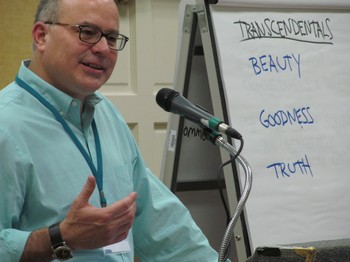Many gospels are being preached in churches today, but few seem to produce transformation in the lives of individuals or the world, James Bryan Smith told the opening session of the Disciple-Making Conference of the Presbyterian Church (U.S.A.) here today (Jan. 21.)
“The gospel is all around us, so why isn’t it changing everybody?” asked Smith ― a United Methodist college professor from Wichita, Kan. “I think the biggest problem is that very few people understand the (gospel) story in its full implications and turn instead to a very thin form of the gospel that doesn’t lead to transformation…the gospel many people believe is not wrong, it’s incomplete.”
Smith outlined three “incomplete” gospels prevalent in Western Christianity today:
- “the gospel of the right”: “This gospel teaches ‘believe that Jesus is the Son of God and you will be saved and go to heaven when you die.’ That gospel, because it’s focused on the next life, not this life, doesn’t naturally lead to discipleship, to DO anything.”
- “the gospel of the left”: “This gospel calls people to make the world a better place, which is a noble idea, but it makes no mention of living an interactive life with God in Christ.”
- “the gospel of the church”: “This gospel says ‘be good to your church and your church will be good to you.’ All it requires is that you attend worship, tithe, serve on a committee, participate in Bible study and engage in service projects.”
What’s missing, Smith said, is the gospel of Jesus, which simply put is that “the kingdom of God ― an intimate interactive relationship with God ― is available to everyone right here right now.” In the gospels, in fact, Jesus talked about the kingdom of God more than 100 times.
“Jesus taught, ‘You can have an interactive relationship with God.’ THAT was the good news that people flocked to,” Smith said. Transformation begins, he said, when people hear AND understand, “that God loves us and wants an intimate relationship with us.”
He described a “triangle of transformation” common to all people that begins with their formation. “We are people who have been formed are in the process of being formed. The three interrelated corners of the triangle are:
- Narrative ― “those influences on us that have been converted into stories … which is the way we frame our understanding of everything … that’s why Jesus taught in parables.”
- Practices or habits ― “we spend, on average, seven hours a day in front of screens ― we like screens. We like to see stuff and learn things. There’s also books and magazines, when and what we eat, how we exercise and use our bodies, what we consider entertainment, the ways we spend money.”
- Communities ― “We are shaped by other people, adopting attitudes, understandings and behaviors, primarily by our families but also friends and peers. As adults we spend most of our time in the workplace, so co-workers shape us. And those of us in the church are shaped by the church ― members and pastors ― over time.”
When it comes to transformation, Smith continued, “we are resistant to change, but at a certain point people begin to say ‘I want to change’ or ‘I need to change’ or ‘I have to change.’ What leads us to that?”
Most people think it’s a matter of will-power, Smith said. “But the problem is that the will has no power. It is the ‘chooser,’ influenced by … the exact same sources that formed us in the first place … that’s why 90 percent of new year’s resolutions are broken by the end of January.”
The key to transformation, Smith said, “is to respond, not to will-power, but to the Holy Spirit, which is always at work in us in many ways. We may have great intentions but we have to quit operating at the level of will-power and change our narratives, change our practices and become subject to different communities.”
Our story is an incredible story, Smith said. “It is the story of a God whose character and essence is love, who out of love for us became one of us to live a life we couldn’t live by ourselves and who died and lives again so that we might live every day in the kingdom of God.”
That kingdom exemplifies the “three transcendentals of God”: beauty, goodness and truth, Smith said.
“We innately love these (transcendentals) because we are made in the image of God and so are made for them, too. This is God’s story and when we get caught up in it we will be transformed.”

